Last Updated on January 21, 2022
In today’s time, the global business industry is taking a huge shift from the traditional commerce to selling online or ecommerce. This shift is not resultant due to just global coronavirus pandemic but ecommerce business also give multiple benefits such as selling products 24 x 7 to the audience, spending fewer costs in running the store vis-à-vis a brick-and-mortar store. There is a huge range of ecommerce development platforms available in the market which baffles the new startups or entrepreneurs to make a perfect choice. We have delve through several ecommerce platforms for developing an online store, and in this article, we will be comparing the two big competitors: Shopware & Magento.
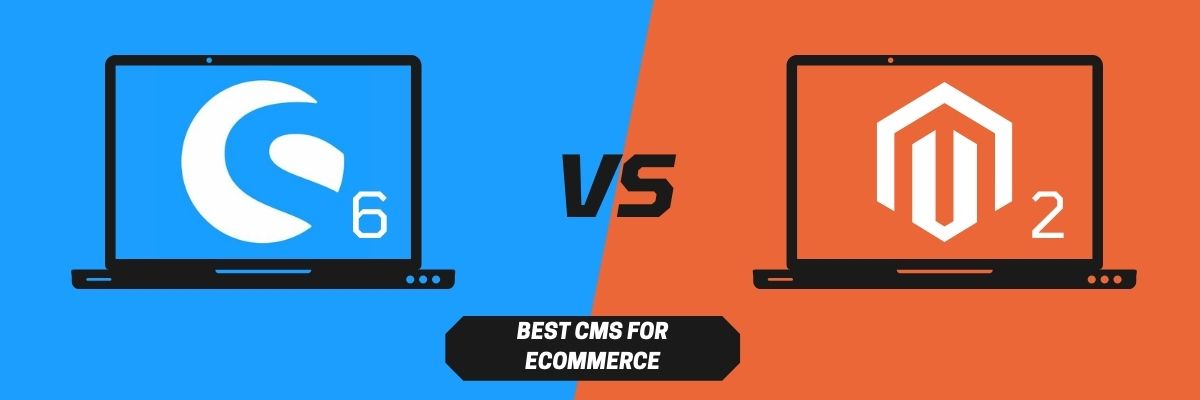 Shopware is a comparatively older platform which has captured the ecommerce market of German-speaking countries and European user base is still growing. On the other hand, Magento is having a vast presence in the global ecommerce industry with a market share of nearly 12%, and used by many popular top brands.
Shopware is a comparatively older platform which has captured the ecommerce market of German-speaking countries and European user base is still growing. On the other hand, Magento is having a vast presence in the global ecommerce industry with a market share of nearly 12%, and used by many popular top brands.
We will be evaluating these ecommerce development platforms on the basis of several factors such as Pricing, Versions, Ease of Use, Features, SEO & Marketing, Apps & Extensions, and many more. Let’s start with a brief introduction to each platform.
Magento
It is unlikely that you haven’t heard of Magento in the ecommerce industry. Founded in 2008, Magento now comes in two different editions: Magento Open Source (Community Edition), and Magento Commerce. Magento Open-source is used by newcomers or startups as it requires fewer resources to set up, on the other hand, Magento Commerce is being used by medium or large scale enterprises that have established their online business. It is a paid edition of the Magento and comes with many existing additional features.
Shopware
Founded in 2000 in Germany, Shopware is in the ecommerce industry for the last two decades. Just like Magento, Shopware is an open-source project. Although, it was having a great presence in Germany now it is getting more popularity across the globe.
The latest version of Shopware is 6.5 and it receives new updates on a regular basis. You can easily install these updates and can be done through the web interface.
Shopware Vs Magento Overview
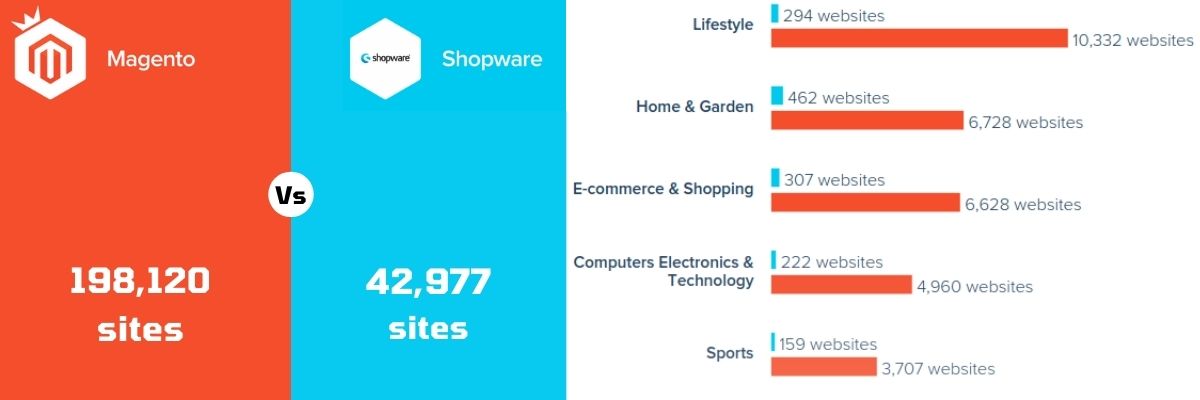
Shopware is the most popular and progressive platform in German-speaking nations. It is having a market share of 4.70% and has more than 40,000 live ecommerce stores. Germany alone is contributing more than 90% of the Shopware market and the other countries are Spain, France, Switzerland, Great Britain, Italy, Netherlands, Austria, and the USA.
With more than 12% of the ecommerce market share, Magento powers over 250, 000 ecommerce stores. It has become a new industry standard regarding ecommerce CMS. The platform is feature-rich and many popular brands such as Nike, Burger King, Coca Cola, Christian Louboutin, etc. are using it. Magento is having vast popularity in the USA & Great Britain, and a good presence in other countries like Canada, Spain, Australia, Italy, France, Netherlands, and Germany.
Now let’s dive and go through all the comparison factors starting with the pricing.
Pricing
Generally, people go through features, marketing & SEO, and other comparison factors, but after going through pricing, all other factors seem vague. Thus, let’s compare the platform on the basis of pricing first.
Shopware
Whether you want to quickly enter the ecommerce industry or want to develop an ecommerce site with next-level requirements, Shopware has a lot of options for store owners. Currently, there are 3 editions offered by Shopware:
1. Starter Edition
This is the basic edition of Shopware which is free of cost. It will be hosted on the cloud and its hosting will be managed by the Shopware team. However, it comes with limited features. Some popular features of the Starter Edition are No minimum contract period, Free of cost, Free SSL certificate, GDPR compliant, Automatic updates and maintenance, easy integration with payment and shipping methods, etc.
2. Professional Edition
This is the mid-range Shopware edition. It will give you an astonishing brand presence with comprehensive service. It costs € 199 per month or you can buy it once at € 2,495. This edition gives you the flexibility to choose between self-hosting or hosting on the Shopware cloud. It comes with all the features of the Startup edition and other features are additional sales channels, support for multi-currency, and multi-languages, storefront customization, landing pages, category pages, etc.
3. Enterprise Edition
Enterprise edition is the most advanced edition of Shopware. It gives you complete control as it is self-hosted and customization through your existing IT infrastructure. To know the cost please contact their sales team. It comes with all the features of the Professional edition and the additional features are unlimited staging environments, Elasticsearch for search functionality, additional sales channels, marketplaces, social shopping, etc.
Magento
Technically, Magento is free of cost but if you want to increase the functionality of your site then you may require extensions that may or may not be free of cost. Since this platform is best for large-scale businesses, the price is definitely offbeat. There are 3 different editions of Magento.
1. Magento Open-Source
Magento Open-Source is free of cost but you have to pay for the domain, hosting, and security. If you want just a startup and looking for a free version of an ecommerce development platform then you must try the Magento community edition. You just need to hire a Magento development company like us who can set up the ecommerce store on this platform.
2. Magento Commerce
Magento Commerce is a highly reliable solution for enterprise-scale companies. It comes with many advanced features and next-level features & functionalities. It comes with a varying cost as follows:
| Average Gross Sales Revenue (in USD) | Magento Commerce Cloud Cost |
|---|---|
| Less than 1 million | $22,000 per year |
| Between 1-5 million | $32,000 per year |
| Between 5-10 million | $49,000 per year |
| Between 10-25 million | $75,000 per year |
| More than 25 million | $125,000 per year |
3. Magento Commerce Cloud
This is the most premium edition of Magento which is suitable for the big organizations or large companies. It is quite similar to Magento Commerce but the data is stored on Cloud instead of a hard drive. You get all the features of Magento with this edition and that’s why the Magento Commerce Cloud is quite higher than the other editions.
| Average Gross Sales Revenue (in USD) | Magento Commerce Cloud Cost |
|---|---|
| Less than 1 million | $40,000 per year |
| Between 1-5 million | $55,000 per year |
| Between 5-10 million | $80,000 per year |
| Between 10-25 million | $120,000 per year |
| More than 25 million | $190,000 per year |
It is clear to observe that Magento is more suitable if you are a medium or large scale company while the Shopware is more suitable for small businesses as well.
Usability
Both Magento and Shopware let’s you modify the underlying code in accordance for your website requirements. Now the question arises “Which ecommerce platform is more user-friendly, Shopware or Magento?”
Shopware
Shopware brags for its easy to use admin panel from the initial release. Thus, you can quickly start using this CMS even if you are a newbie in the ecommerce industry. The backend is compatible with any OS and browser. However, for the developers, the initial setup of the Shopware store is not a cakewalk.
Shopware admin is no longer divided into individual windows. This central location will give you an overview of all settings in a clean manner. For e.g. you can easily check received orders, manage the customers, and create Shopping experiences. It comes with drag-and-drop features by which you can easily create new pages. In short, Shopware is fairly easy-to-use even for non-technical merchants.
Magento
There is always a poor side of something, and Magento features are not exceptional. As Magento is packed with so many features, it becomes quite complicated to use. The daily operations and the admin panel is quite straightforward to use. However, the initial setup of the store is quite complex and only experienced developers like us can do this very well.
The UI of the latest Magento versions has improved a lot, it brings out improvements in the management interface that streamline the search of data in the Admin Panel and enables the creation of new content easily. You can also refer to the documentation of Magento 2 or search for help online.
Basically, both Shopware and Magento require the online retailers to have some experience in technicalities or coding. If you want to operate your online business in Europe or a German-speaking country then Shopware would be a better choice and if you are an enterprise company then opt for Magento.
eCommerce Features
Shopware
Shopware is serving ecommerce for nearly the past two decades because of its ecommerce features. Let’s have a look at a few major features:
1. Product Management
Products are just like the cells of an ecommerce store. For a better user experience, you must provide all the product details you sell in a descriptive manner. Effective product management is must require for this.
Creating a product in Shopware is easy and you can also configure them with the prices and images. You can also create rule-based attributes with a merchandising capability. For eg., rule-based merchandising will let you promote products above other brands or boost products with a wider margin.
2. Customer Stream
Also known as customer segmentation, in Shopware you can create customer stream as per different criterion. It includes gender or the amount spent to allow automation. For e.g. you can create a stream of customers who are below 25 years and have made a purchase of more than $5,000 in your store.
Another feature is that if a new user meets this criterion then he/she will also automatically to this customer stream. You can use this stream for promotions, marketing campaigns, newsletters, that fit the target audience.
3. Shopping World
Shopping World is probably the most innovative feature of Shopware by which you can promote your products. Using this feature, even the non-tech store owners can create landing pages, and edit the content of the site. The Shopping world uses a drag-and-drop feature for products, blog posts, video guides, and banners. The brands can build a better engagement level with new as well as existing customers.
Shopware also comes with in-built blogging features such as user management, digital publishing, media management, and an easy theme system.
Magento
Although, Magento is quite costly in comparison to Shopware it is worth it as you get a lot of features with Magento. Let’s have a deeper look at some of the stupendous features of Magento:
1. Inventory Management
The Community Engineering efforts of the Multi-Source Inventory (MSI) are supporting the Inventory management features. MSI gives you tools by which you can control your product inventory. Whether it is a merchant with a single store or have multiple warehouses, pickup locations, drop shippers, etc. can utilize these features for maintaining sales quality and manage shipments to complete orders. You can easily track inventory stock and ship according to manual selections.
2. Returns
RMAs, or Returned Merchandise Authorizations, let the customers make refunds or replacements of their orders. In the Order and Returns Interface, the customer can create order and return details to request a return. After approval, a unique RMA number will be assigned for return product identification. You can enable RMA for all products or some specified products.
RMAs are often issued for simple, grouped, configurable, and bundle product types. However, RMAs are not available for virtual products, downloadable products, and gift cards.
3. Related Product Rules
Using the Related Product Rules, merchants can specify which related products, up-sells, and cross-sells will be displayed in the product pages conditionally instead of manually. The rules are mostly associated with a customer segment for dynamic targeting. It is one of the most powerful time-saving features of Magento.
4. Scheduled Import & Export
The merchants can schedule imports and exports using Scheduled Imports & Exports on a monthly, weekly, or even daily basis. It is highly useful after integrating 3rd party services.
The import feature includes Advanced Pricing, Products, Customers, and Addresses, Customers Main File, and Customer Addressees. The export functionality includes Products, Customers Main File, and Customer Addresses.
SEO & Marketing
Shopware
In terms of SEO & Marketing, the Shopware SEO configuration comes with a solid core for efficient Google ranking. There are highly powerful features for sales promotion. Also, you can modify all the SEO settings automatically.
One such feature is “Storytelling”, you can make your store authentic and unique using this store. This emotional catalyst can boost the shopping experience of your store. After clicking or touching the image of the product, the customer can check the further details of the item linked to the image. This engaging approach makes the customer journey better.
There are also SEO plugins that you can use for boosting traffic and conversion. For e.g. SEO professional plugin comes with a large number of SEO settings/optimization in just one plugin.
Magento
Magento is also having rich SEO features to help merchants maintaining relationships with buyers and increasing traffic on the store. In Magento, you can create multiple coupons for specific online stores. Another next-level feature in Magento is the reward points that we mentioned earlier. It will motivate your customers to come back to your store and make purchases for more reward points.
Also, Magento marketing features are as per the edition you use. Obviously, enterprise editions are having most features and in Magento Open-source you can use SEO & Marketing Plugin to extend all the possibilities.
Apps and Extension
Whether it is Shopware or Magento, if you require a custom functionality, then you may need a 3rd party extension which you can install on your store and extend its capabilities. Let’s know about the availability of these apps & extension on both these platforms.
Shopware
Shopware is having a huge community in Germany and other German-speaking countries, thus you can find a lot of modules, plugins, or apps on the Shopware marketplace. However, there is a drawback.
Shopware extensions are available in German only. It would have been justified if some extensions are in German but now Shopware is Europe-oriented, thus if you require a plugin for a payment method or inventory provider, then you may not find a good one. This is one of the most critical factors of Shopware that merchants must know.
Currently, there are more than 3,500 modules on the Shopware marketplace. All these extensions have been approved by the Shopware developers. There are quite affordable as well with a price range of €0,00 to € 7,990.00.
Magento
Magento extensions are one of the enriching tools that this platform offers as you can extend the desired functionalities on the store. There are more than 5,000 Magento extensions available for the 250,000 Magento merchants. A lot of these extensions are available freely. When it comes to extensions, quality counts for so much more than the number you have installed. Just one poorly coded extension can be one extension too many and can start causing you problems. Thus, always choose a good extension by checking the reviews and functionalities it provide.
The major categories of the Magento extensions are Accounting & Finance, Content & Customization, Marketing, Payments & Security, etc. The only drawback in Magento extensions is the issue of compatibility. Many times the extensions build for a Magento version doesn’t work properly with the higher upgraded versions.
Beside the free extensions, the price for the rest ranges from $40 – $10,000 or even higher depending on the value you need.
Support
Shopware
There is a monthly fee associated with the Shopware customer support and therefore you get good quality support. There will be a technical account manager for general inquiries and Shopware related issues.
Shopware has its own forum which is available in German only. Therefore, those who can’t understand German will find this overwhelming. Shopware has an academy with live training, webinars, and certifications.
Magento
The customer support of Magento is highly reliable. However, you will not get any Magento customer support if you are using the Magento open-source version. The customer support is available for only Magento Commerce and Magento Commerce Cloud. But there are blogs, forums with informative and knowledge-based tips or reviews.
Wrapping Up
We hope this article would be easier to understand for you and will help you to choose an ecommerce development platform for your store. Both these platforms are having great features by which you can manage your online business effectively.
It has been observed that Shopware is more suitable for small or medium scale businesses considering the cost factor. But at the same time, it would be challenging the features as the Shopware extensions are limited and come in German language only. Magento is a good option for medium to large scale enterprises and it has a huge range of extensions as well but it may take more time to take your business online.
At Emizentech, a reliable and reputed ecommerce development company in India, we are having expertise in developing ecommerce stores from scratch using both these platforms. We will also give you proper consultation while choosing the platform in accordance with your business requirements, target audience and much more.

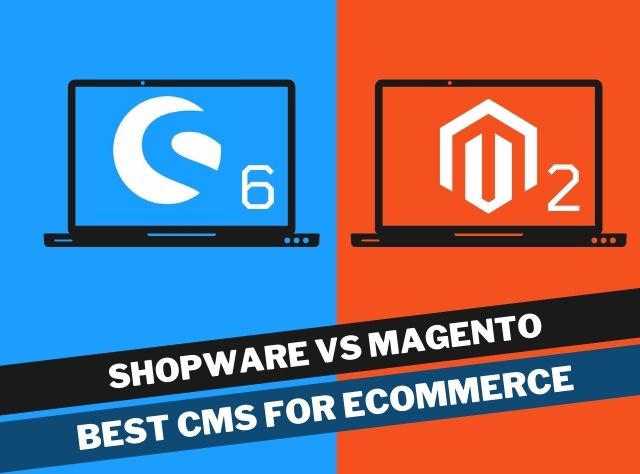

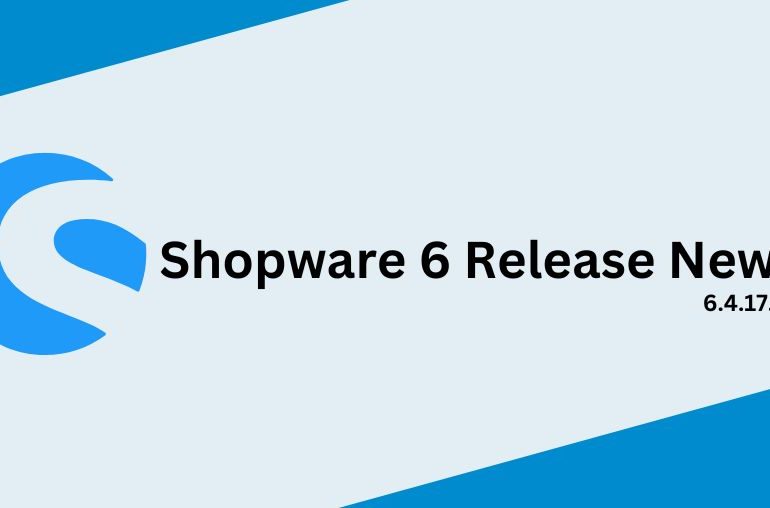

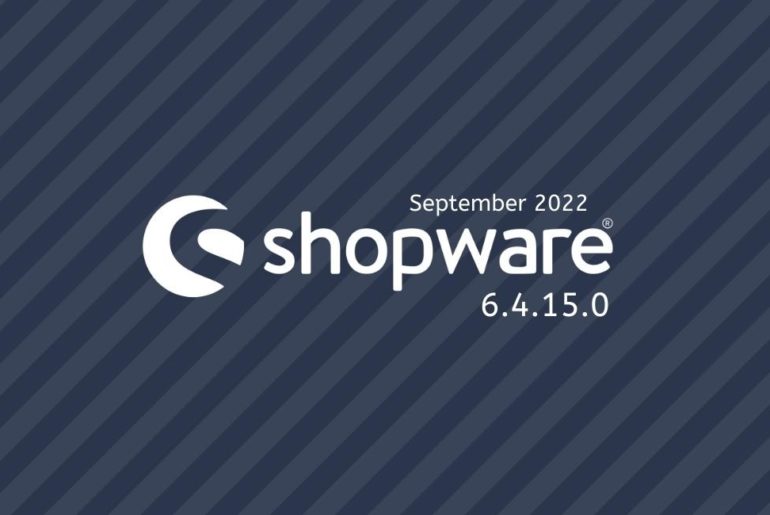
 USA
USA UK
UK Singapore
Singapore